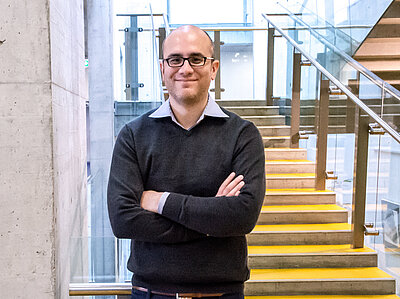Alejandro Burga elected EMBO Young Investigator
Each year, the European Molecular Biology Organization (EMBO) selects the best young group leaders in the life sciences in Europe to join the EMBO Young Investigator Programme and become part of an international network of scientific leaders. EMBO Young Investigators must have established their own labs within the past four years, and have a proven record of scientific excellence. As part of the programme, EMBO Young Investigators receive financial, academic and practical support to advance their research careers, and are connected in a network of more than 700 outstanding researchers.

The successful candidates have access to a wide range of benefits including networking opportunities, training in leadership skills and responsible research practices, support for their lab members, and access to core facilities at the European Molecular Biology Laboratory (EMBL). In the second year of their tenure, Young Investigators receive an award of 15,000 Euros, and they can apply for further funding, travel grants and take advantage of mentorship opportunities. Researchers go through a highly competitive selection process to join the programme: This year, 201 applicants competed for spots in the EMBO Young Investigator Programme, and only 26 were selected.
Alejandro Burga's group is dedicated to unraveling the intricate dynamics between selfish genetic elements and their hosts, aiming to understand how this conflict shapes the evolution of organisms. Their exploration spans from the origins of molecular complexity to speciation dynamics. “Selfish elements are regions of the genome that prioritize their own survival with little or no regard for their host” explains Burga. While conventional wisdom often portrays these elements as mere outlaws residing on the outskirts of our genomes—unavoidable parasites kept at bay by robust host defense systems—Burga and his group challenge this perception. The colossal evolutionary pressures experienced by selfish genes make them the ideal breeding ground for the evolution of novelty. According to Burga, exploring this battleground is essential to understanding why cells and organisms are the way they are today.
“Being selected for the EMBO Young Investigator Programme is an honour, I am very grateful for this recognition,” says Burga, who especially thanks his lab members, past mentors, and the support of IMBA and the Vienna BioCenter. “Joining the EMBO community is a wonderful opportunity to connect with other young and established researchers across Europe, learn about their fascinating science, and foster the exchange of new ideas.”
David Haselbach from the neighbouring Research Institute of Molecular Pathology (IMP) has also been appointed to the programme.
EMBO is an international organisation of life scientists and directs funding from member states towards research fellowships, courses, workshops, conferences, and science policy initiatives. EMBO also has a stable of prestigious life science journals. The administrative headquarters is in Heidelberg, Germany. More information can be found here: www.embo.org.